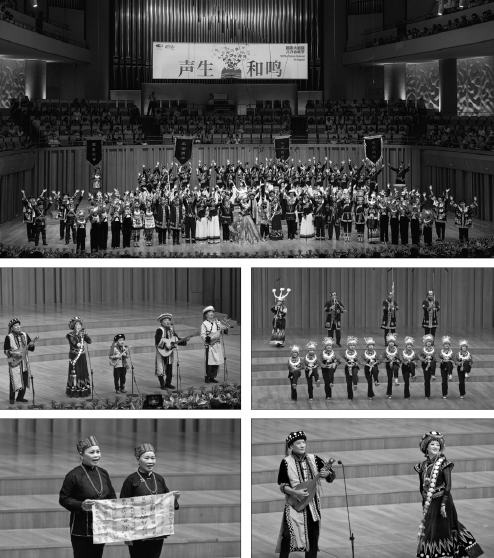Ethnic harmonies
Musicians and singers, representing the Nu, Lisu, Miao, Zhuang and Dong people, among others, kick start the NCPA August Chorus Festival, Chen Nan reports.

Jiang Xiaochun's first musical instrument was a dabiya that his father made for him.
Growing up, Jiang, a musician, who belongs to the Nu ethnic group from the Nujiang Lisu autonomous prefecture, Yunnan province, earnestly learned and played the four-stringed, plucked instrument, which resembles a pipa, but is much smaller in size.
"The dabiya is like a totem for the Nu ethnic group. We take it wherever we go, even hunting and farming. For example, when a man expresses his affection for a woman, he plays the dabiya and sings rather than talking to her," says Jiang, 45.
"Because the Nu ethnic group has no written language, in the past, our ancestors used music to record our history and our daily lives. The dabiya is a musical instrument that belongs to every family of the Nu ethnic group," he adds.
When he was invited to perform at the National Centre for the Performing Arts in Beijing on Aug 4 and 5, Jiang took his dabiya and traveled around 3,000 kilometers to the capital by bus, train and airplane.
Along with his band, named Wood and Fire, Jiang performed six songs he adapted from folk music of the Nu ethnic group, including Tiger and Otter, Toast Song of the Nu People and The Love Song of the Nu People.
"It's definitely the peak of my music career. We had never performed at the NCPA, one of the top-level art institutions in the country, before. The four members of our band all have regular jobs and we rehearsed every night after work for the concerts," says Jiang, adding that his 6-year-old son also joined in the performances.
Wood and Fire, which was founded by Jiang in 2015, features four members, including Jiang's wife, Zhang Xiaohui, and was one of the ensembles that performed in the opening concerts of the NCPA August Chorus Festival.
Liu Xiaogeng, a veteran composer and the artistic director of the concerts, says he curated the programs from over 100 folk songs from Chinese ethnic groups, hoping to display the beauty and the diversity of Chinese folk music. People from nearly 10 ethnic groups from Southwest China, including Nu, Lisu, Miao, Zhuang and Dong, performed in the concerts.
"The songs were divided into four chapters: Love Songs, Singing for Nature, Toast Songs and Singing for a Good Life. The value of the songs goes beyond music itself. They need to be preserved and heard because they provide access to the origins of the cultural identity of those ethnic groups," says Liu, who was born and raised in Yunnan's Luquan Yi and Miao autonomous county. He graduated from Yunnan Arts University as a composer in 1981 and has traveled around the country collecting, researching and adapting ethnic music into songs for choral singing. So far, he has collected over 6,000 folk songs from ethnic groups in Southwest China.
"Their songs conjure up images of mountains, rivers and forests, which provide a great escape for people living in cities," adds Liu.
Wu Chenglong, a man from the Dong ethnic group from Qiandongnan Miao and Dong autonomous prefecture, Guizhou province, also made his debut at the NCPA by performing as a member of the Huanggang Dong Ethnic Group Chorus. The chorus performed, among other songs, Coming From Afar to Meet You, We Are Pledging to Marry Each Other and Beautiful Mountains.
The Huanggang Dong Ethnic Group Chorus, led by Wu, is known for performing in the Grand Song style, which involves multipart singing performed without instrumental accompaniment or a conductor.
Liu says that when he visited Dong ethnic group villages, he was impressed by the group's Grand Song tradition, which has a large repertory based on children's songs, and songs about nature, and for families and lovers. He was particularly interested in the local singers' ability to mimic the sounds of animals. The Grand Song of the Dong ethnic group was inscribed on UNESCO's Representative List of the Intangible Cultural Heritage of Humanity in 2009.
"Our chorus has over 100 members, 42 of whom performed in the concerts at the NCPA," says Wu, who was listed as an intangible cultural heritage inheritor by the government of Guizhou in 2010. "We were very excited to sing our songs at the NCPA. We usually sing those songs spontaneously at home or in public places around our village."
Since 1999, Wu has been learning, performing and preserving music of the Dong ethnic group. With his niutuiqin, a stringed musical instrument with a shape resembling a cow's leg and played with a bow in a manner similar to that of a fiddle, he has adapted ancient folk songs and also written some original ones.
The opening concerts also featured the Poya Song Book Choir, which is from Poya village, Funing county, Wenshan Zhuang and Miao autonomous prefecture in Southwest China's Yunnan. The choir, founded in 2012, is committed to singing songs from the Poya Songbook, which originated in Poya village and is a collection of Zhuang ethnic group folk songs recorded on a piece of hand-woven cloth bearing 81 pictographic characters. Each of the characters symbolizes a folk song of Zhuang ethnic group. In 2011, the Poya Songbook was added to the National Intangible Cultural Heritage list.
From Aug 4 to 20, the annual NCPA August Chorus Festival, themed "Sound and Harmony", is staging 13 choral concerts from all over the world. Highlights will include the award-winning Inner Mongolia Youth Choir, founded in 2008 and led by its conductor Yalungerile, which will perform songs from the Mongolian ethnic group in a concert on Tuesday, the China National Traditional Orchestra Chorus, which will draw a Chinese musical map by performing folk songs from different parts of the country, and Spanish vocal group, B Vocal.
The NCPA August Chorus Festival will close with a concert featuring the chorus of the China National Symphony Orchestra. Conducted by Wang Linlin, the concert will feature Chinese songs, including Xinjiang Youth Dance, Rainbow After the Storm and Yellow River Cantata.

Today's Top News
- Xi urges central SOEs to contribute more to Chinese modernization
- Five continents, five rhythms in 2025
- Lawmakers review draft law to expand childcare services
- China's new-style tea brands find a hot new market in US
- Xi extends congratulations to Chilean president-elect
- Japan urged to stop provocative moves






























